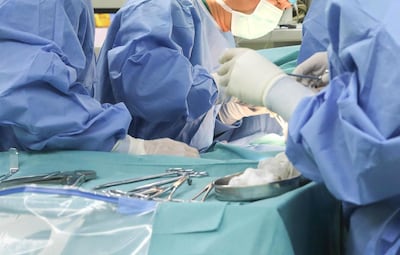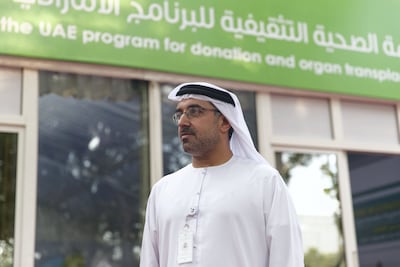When Hussain Shabeeb Al Shabeeb opened a forwarded WhatsApp video of a mother and her sick son who urgently needed a kidney transplant, he knew he had to help.
“Donating my kidney had never crossed my mind but 20 seconds into that video, I knew I had to do something,” the Saudi father of three told The National. “I couldn't see a mother crying for help and do nothing."
Mr Al Shabeeb did not know the family, but he immediately texted his wife, Sabah Mosa, 45, telling her that he had decided to donate a kidney.
organ donor
“I wasn't surprised,” she said. “It felt like he was waiting his whole life to do this. He was always saying that he wanted to do something more than just donate money, and this was it.”
Mr Al Shabeeb, 44, then called the child's family to tell them the good news.
“I was praying the whole time that no one would beat me to it and that I would be a matching donor,” he said.
The operation was completed on December 18 last year, and five weeks after the transplant, Mr Al Shabeeb travelled to Dubai to convince others to donate their organs at a kidney donation conference.
“There is no greater joy than helping to save someone's life. I know this is hard to believe but they were doing me a favour. I am grateful to them and thank God for this opportunity,” he said.
UAE organ donation laws
The UAE introduced its Organ Transplant Law in 2016, allowing deceased organ transplants and addressing requirements for living transplants.
The law allowed living kidney donations from family members up to the fourth-degree relatives.
Six years later, the country launched the National Programme for Organ Donation and Transplantation – or Hayat, the Arabic word for life – to support increasing organ donation and transplantation with extra resources.
In September last year, the UAE passed Federal Decree Law No 25 of 2023, which permitted altruistic kidney donations in the country for the first time.
Dr Mohamed Al Seiari, a consultant transplant nephrologist at Sheikh Khalifa Medical City in Abu Dhabi, said doctors expected to perform their first transplant from an altruistic donor – someone who donates their organs to people they do not know – in the next few weeks.
“The chains that we could make from one altruistic donor could go up to 100,” he said. “And this is where the beauty of altruistic donations lie.”

A chain starts with someone who wants to donate a kidney to an unknown person. That kidney is then transplanted into the recipient who had a donor willing to give a kidney but was a non-match.
To keep the chain going, the incompatible donor gives a kidney to an unknown patient who is a match, essentially “paying it forward”.
Altruistic donors
Mr Al Shabeeb is one of many altruistic donors around the world.
Laura Maisey, who flew to Dubai to attend the UAE Organ Donation and Transplantation Congress, decided to donate a kidney to a stranger.
The 38-year-old from Chelmsford, England, registered as an altruistic donor at Guy's Hospital in London in 2019. A year later, she received a call and was asked to isolate on Christmas Day due to the Covid-19 pandemic.
Ms Maisey's kidney was donated to a man called Stuart whose own kidneys were failing.
A month after the operation, Ms Maisey received an email from Stuart thanking her for saving his life. They have since kept in touch regularly.
“My story is very simple. I heard about it and I said, 'Why not?'” she told The National. “I can honestly say it has changed my life. There are a few times that you get a chance to make a difference to someone.”
Reducing waiting lists
Countries all over the world have computer programmes that match donors to recipients, yet 17 people die each day waiting for a transplant.
“We will always have people on waiting lists, but altruistic donors can help reduce this number,” Dr Al Seiari said.
“I believe that people are intrinsically kind, particularly Emiratis, and we will see people coming forward wanting to donate their organs which help us expand our pool of organs to include neighbouring countries."
Sheikh Khalifa Medical City has performed 571 kidney transplants since the start of the UAE's organ donation programme. However, there are currently 30 pairs of donors and recipients who are not a match.
The recent law changes in the UAE mark a significant advancement for organ donation, according to Dr Waldo Concepcion, transplant surgery consultant at Dubai Health.
He said the changes address organ shortages, reduce waiting times and respect people's autonomy and choice, allowing them to make meaningful contributions to other people's lives.
“These changes signify a commitment to improving health outcomes and ensuring long-term care for transplant recipients,” Dr Concepcion said.

“Overall, the amendments represent a pivotal step towards a more inclusive and effective transplantation system in the UAE.”
The country has the fastest-growing deceased organ transplant programme in the world, according to the International Society for Organ Donation and Procurement.
In five years, it has seen a growth rate of 417 per cent.
There have been more than 2,020 deceased donors and 826 transplants performed from deceased donors since 2017.
Deceased donations in the UAE saved 276 lives in 2023, up from 11 lives in 2019.
“The UAE is looking into the future,” Dr Ali Obaidli, chief medical officer for Seha kidney care and chairman of the UAE National Transplant Committee, told The National.
“2023 is the year the UAE generated more laws than ever and this law was one of them. However, the aspiration is for countries to be self-sufficient, and the only way to do that is through collaborations.”
Global collaboration
“Imagine all the possibilities if regional countries were collaborating, exchanging expertise and sharing resources,” Dr Obaidli said.
He pointed to the FOEDUS-EOEO platform – a portal for the exchange of surplus organs across European borders – which was relaunched in 2012 to allocate deceased donor organs.
Similarly in 2022, 43 Commonwealth countries joined the Commonwealth Tribute to Life project to increase ethical tissue organ donation and transplants.
“The UAE's new law has a strong emphasis on international collaborations due to these successful international examples and the WHO's recommendations for regional collaborations,” Dr Obaidli said.
“Particularly in a country like the UAE, which has a large expatriate population, it is an amazing opportunity to work with many of their home countries and build complementary organ donation and transplantation services.”
Cleveland Clinic Abu Dhabi, which has the first and only multi-organ transplant centre in the UAE, has successfully completed more than 500 organ transplants since 2017 and is an active partner of the Hayat programme.
Dr Bashir Sankari, chairman of the Surgical Subspecialties Institute at Cleveland Clinic Abu Dhabi, said: “We believe that through collective partnerships between the healthcare entities, we are able to save the lives of countless patients who need a transplant and reaffirm the UAE's position as a leading destination for healthcare.
“Cleveland Clinic Abu Dhabi works in close collaboration with neighbouring countries. Furthermore, we are part of the global Cleveland Clinic network, which helps us provide advanced expertise and technologies to our patients, while adhering to international standards.”
Dr Sankari said he believes that a culture of organ donation begins with education and awareness campaigns.
“Our dedicated Hayat booths at the hospital serve as a valuable resource for patients and visitors to learn about the programme and register as organ donors, and our efforts will continue to be aimed at bridging the gap between the organ demand and availability of organ donors,” he said.
